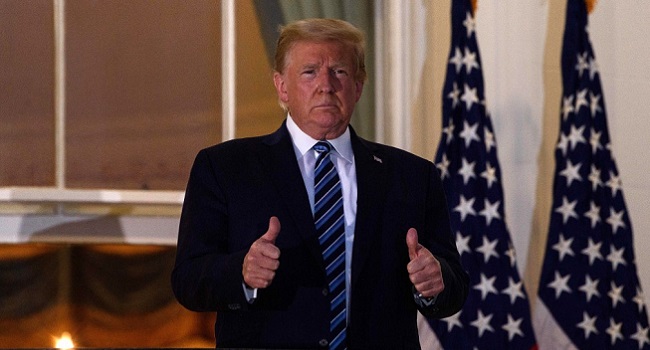Despite trailing in the polls barely one week from election day, US President Donald Trump on Monday will likely celebrate a monumental victory for the conservative cause: his third nominee confirmed onto the US Supreme Court.
Appellate Judge Amy Coney Barrett is all but certain to become the ninth justice on the nation’s highest court, after Democrats failed to derail the contentious process in a sharply divided Senate.
In a rare Sunday session, the Senate’s Republican majority overcame a filibuster by Democrats, and Barrett’s nomination cleared a procedural hurdle, 51-48, to set up a confirmation vote Monday evening.
“By tomorrow night, we’ll have a new member of the United States Supreme Court,” Senate Majority Leader Mitch McConnell told the chamber.
“The other side won’t be able to do much about this for a long time to come.”
Barrett’s ascension to the seat left vacant by the September 18 death of liberal icon Ruth Bader Ginsburg would essentially lock in a 6-to-3 conservative majority on the high court.
Democrats have warned that Barrett, 48, could vote to gut Obamacare, which has helped millions of Americans gain health insurance, and perhaps overturn Roe v Wade, the landmark 1973 decision protecting abortion rights.
They have been left steaming over the process. Senate Republicans blocked Barack Obama’s Supreme Court pick in March 2016, arguing it was too close to an election still eight months away.
But when Trump nominated Barrett 38 days before the 2020 election, Republicans embraced the move.
Top Senate Democrat Chuck Schumer on Sunday called the confirmation rush a “glaring hypocrisy” that would leave “an in-erasable stain on this Republican majority.”
– Procedural fight ‘lost’ –
Two other Trump nominees, Neil Gorsuch in 2017 and Brett Kavanaugh in 2018, are already on the court after bitter partisan fights.
The president’s first term has been controversial, but his Supreme Court confirmations are “at the top of the heap” of accomplishments, Republican Senator Marsha Blackburn told Fox News.

The current process has moved with uncommon speed, taking just 30 days from Barrett’s nomination to her likely confirmation — less than half the 69.6 day average from nomination to final Senate vote, according to a 2018 congressional report.
Trump, who trails his Democratic challenger Joe Biden, has said he wants the Barrett confirmed before the November 3 election and in place in the event the court hears an election-related challenge.
Two Republican senators, Susan Collins of Maine and Alaska’s Lisa Murkowski, voted against moving forward after saying in recent weeks that they opposed confirming a justice so close to an election.
But in a turnabout Saturday, Murkowski told colleagues she would vote to confirm Barrett given that there was no chance of blocking the process.
“I lost that procedural fight,” Murkowski said.
“While I oppose the process that has led us to this point, I do not hold it against her as an individual” and will vote for her confirmation, Murkowski added.
McConnell prioritized the confirmation over all other Senate business, including a new bill to provide relief to millions of Americans and companies ravaged by coronavirus.
The pandemic has brought a new wrinkle to the process.
Vice President Mike Pence, who also has a constitutional role as president of the Senate, is expected to preside over Monday’s vote, even though his chief of staff — and reportedly others in Pence’s circle — was diagnosed with Covid-19 this weekend.
The staffer entered quarantine, but a spokesman said Pence, who has tested negative for the virus according to a spokesman on Sunday, will maintain his current schedule.
That drew astonishment from Schumer, who warned Sunday that Pence’s decision puts senators and staffers at risk.
“The Republican Party is willing to ignore the pandemic to rush this Supreme Court nomination forward,” he said.
AFP



















